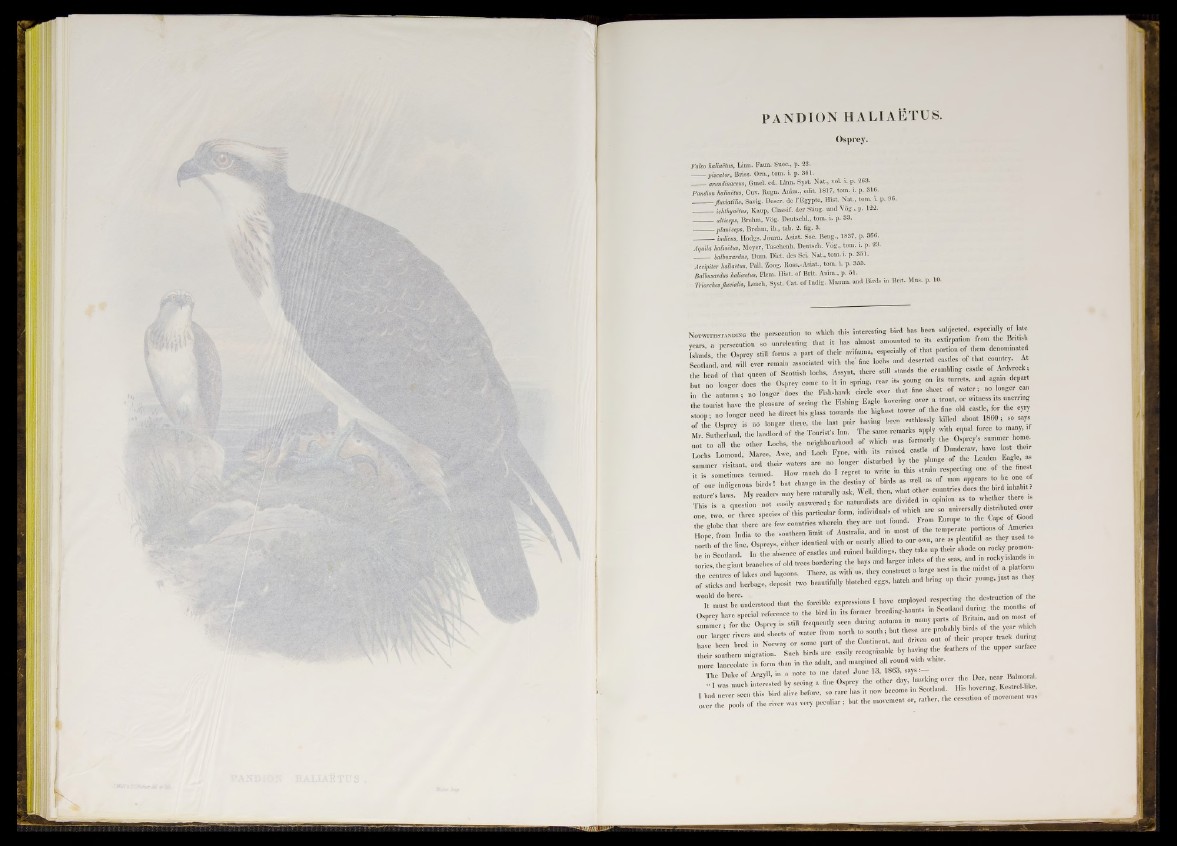
H! 1 1 I
if
\y
PANDION HALIAETUS.
Osprey.
Falco haliaetus, Linn. Faun. Suec.j p. 22.
piscator, Briss. Orn., tom- i. p. 361.
armdinaceus, Grnel. ed. Linn. Syst. Nat., vol. i. p. 263.
Pandion haliaetus, Cuv. Regn. Anim., edit. 1817, tom. i. p. 316.
ßuviatilis, Savig. Descr. de l’Egypte, Hist. Nat., tom. i. p. 96.
ichthyaetus, Kaup, Classif. der Säug, und Vög., p. 122.
— alticeps, Brehm, Vög. Deutschi., tom. i. p. 33.
planiceps, Brehm, ib., tab. 2. fig. 3.
indicus, Hodgs. Joum. Asiat. Soc. Beng., 1837, p. 366.
Aquila haliaetus, Meyer, Taschenb. Deutsch. Vög., tom. i. p. 23.
balbuzardus, Dum. Diet, des Sei. Nat., tom.i. p. 351.
Accipiter haliaetus, Pall. Zoog. Ross.-Asiat., tom. i. p. 355.
Balbusardus haliaetus, Flem. Hist, of Brit. Anim., p. 51. . . .
TnorcKesfinmli*, Leach, Syst. Cat. of Indig. Mamm. and Birds in Brit. Mus. p. 10.
N o t w it h s t a n d in g the persecution to which this interesting bird has been subjected, especially of to e
years a persecution so unrelenting that it has almost amounted to its extirpation from the Bnhsh
Islands, the Osprey still forms a p art of their avifauna, especially of that portion of them denominated
Scotland and will ever remain associated with the fine lochs and deserted cast es of that country. At
“ of that queen of Scottish lochs, Assynt, there still stands the crumbling castlei of Ardvxeck;
but no longer does the Osprey come to it in spring, rear its young on its turrets, and again depart
„ the autumn; no longer does the Fish-hawk circle over that fine sheet of water; no onger can
the tourist have the pleasure o f seeing the Fishing Eagle hovering over a trout, or witness its unerring
stoop; no longer need he direct his glass towards the highest tower of the fine M M
o f the Osprey is no longer there, the last pair having been ruthlessly killed about 1 8 6 0 , says
Mr Sutherland, the landlord of the Tourist's Inn. The same remarks apply with equal force to many, .
Tot to all the other Lochs, the neighbourhood of which was formerly the Osprey's summer home.
Lochs Lomond, Maree, Awe, and Loch Fyne, with its ruined castle of Dunderaw, have t o h
summer visitant, and their waters are no longer disturbed by the plunge of he Leaden Eagle, mi
BBBBi I B M B ■ M B I B u”ed;°
ones, tlie g.a — There, as witli us, they construct a large nest in the midst of a platform
„ /s tic k s and herbage, deposit two beautifully blotched eggs, hatch and bring up their young, ju st as theyI
more lanceolate in form than in the adult, and margined all round with white.